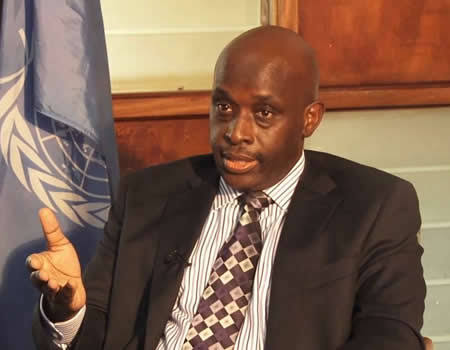
Panellists at a one-day dialogue organised by the United Nations Information Centre in collaboration with the Lagos State Education District III, on Thursday, said that quality education was critical to achieving all the United Nations Sustainable Development Goals noting that acquiring education should not just be about securing employment but also for creating opportunities and building capacity needed for a great future.
The event, themed, ‘Redefining the value of education for the benefit of today’s students’, was held in honour of the outgoing Tutor-General and Permanent Secretary of the Lagos State Education District III, Dr (Mrs) Olufolayimika Abiose Ayandele.
The chief host and Country Director of UNIC, Mr. Ronald Kayanja, noted that quality education was a critical vehicle to achieving all the SDGs, saying that there would be no way to achieve the development goals without functional education.
Kayanja underscored the need for the government, policymakers and educationists to redefine the value of education in Nigeria and expressed delight that Ayandele had been at the forefront of efforts aimed at achieving such a noble objective.
“The Nigerian government, policymakers and other stakeholders should strengthen education in the country. The average time a Nigerian child spends in school is 10 years; while her counterparts in Singapore and Malaysia spends an average of 17 years and 15 years respectively”, he said.
In her remarks, Ayandele while thanking the panellists noted that the dialogue aligned with the Sustainable Development Goal 4, which aimed at ensuring inclusive and quality education for all and promote lifelong learning.
She blamed the Nigerian society for the poor state of education and how schoolchildren perceived education in the country, saying, “Many students are not interested in education anymore because of lack of employment among graduates. Also, how society celebrates people who are wealthy even without any formal education contributes to the young people’s lack of interest in education.
While harping on the need for digitisation to enhance education delivery in the country, one of the panellists, James Fadokun, said 87 per cent of 10-year-old children in sub-Saharan Africa were unable to read and/or write while about 250 million children in the world had literacy and numeracy challenges.
He said, “This is a generation of digital natives, but their teachers are digital immigrants.”
He, therefore, called for a paradigm shift in teaching, stressing that digitisation was key to learning in this age.
When asked about the values of education, a panelist, who is also a daughter of the retiring TG/PS, Olajumoke Ayandele, said, “It is unfortunate we equate education with schooling; that’s why people say education is a scam.”
She stressed that learning must be separated from going to school and advocated that education should go beyond the confines of the classroom.
She stated that, “We need to connect education with our economy if we want to redefine the value of education.”
She noted that the disconnect between education and the national economic strategy was responsible for the poor value of education in the country.
She said skill acquisition should be a vital part of formal education, while encouraging the government and policymakers to leverage the entertainment industry.
The panelists included: Ms Oduolayinka Osunloye, Director Marketing, Innovation & Impact Junior Achievement; Dr James Fadokun, Technical Lead, Governance of Non-State in Foreign Commonwealth and Development Office project, Partnership for Learning for All in Nigeria; Dr Olajumoke Ayandele, a Postdoctoral Research Fellow, New York University; and Mr. M.D. Omisore, Chief Executive Officer, Nurture House Consulting, an author and education enthusiast.
Copyright PUNCH.
All rights reserved. This material, and other digital content on this website, may not be reproduced, published, broadcast, rewritten or redistributed in whole or in part without prior express written permission from PUNCH.
Contact: [email protected]




